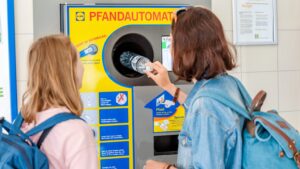
The German bottle-deposit system, or Pfand system, is a regular part of shopping or purchasing any liquid in a bottle in Germany. Most German supermarkets participate in this system. When one buys a drink in a bottle, they are technically paying for the liquid inside and making a small loan on the bottle. When the bottle is returned, the machine releases a Pfand voucher that can be redeemed at the till. Depending on the bottle type, they are either sterilized and reused or shredded into pellets to create other plastic containers.
Many Germans will collect and bring bottles in bulk to these recycling stations. It is also common practice to leave empty bottles next to trash and recycling bins rather than inside them, giving anyone who wants some free change a chance to take the bottle in and return it.
Although this system has been unsuccessful in creating a perfectly reusable container, it has been found to be more ecologically sound than the US method of recycling. Because only single-use bottles are collected, rather than the combination of bottles collected during recycling, the reformed plastic can be deemed food safe and can be reused in the food industry. Bottles that are returned to a manufacturer can be reused up to 50 times before losing their integrity, meaning fewer bottles are made and ultimately less CO2 is emitted during the manufacturing process. This system encourages all parts of the distribution process, the consumer, the supermarket, and the manufacturer, to work together and engage in this system.
This simple system could easily be introduced to the US without any disruption to daily life. America already has the infrastructure to recycle single-use plastic, and many large companies have bottling sites throughout the US where reusable bottles can be returned. Beyond the challenges of creating deposit machines and sterilization facilities, there would also be the cost of transporting bottles, as the United States is much larger than Germany and may have to send the bottles farther away. Another challenge would be making consumers aware of what bottles can be recycled and if they can only be recycled in a particular range within the US. Because the US is so expansive, different bottled water companies control different regions. This may lead to confusion amongst consumers about where they can return their bottles and what supermarkets would accept them.
While this system may take time to adjust to, it contains built-in incentives that would encourage its use. On a consumer and supermarket level, the incentive of getting money back would motivate consumers to return the bottles to the store or manufacturer. On a manufacturer level, the reduced cost of sterilizing and reusing bottles as opposed to producing more If grocery store chains began implementing a system similar to the German Pfand system, it would likely catch on with consumers and become a regular part of everyday life.
Refrences
Bouliane, Nicolas. “The Pfand System: How to Return Bottles in Germany.” Allaboutberlin.com, 25 Feb. 2021, allaboutberlin.com/guides/pfand-bottles.
Oltermann, Philip. “Has Germany Hit the Jackpot of Recycling? The Jury’s Still Out.” The Guardian, The Guardian, 30 Mar. 2018, www.theguardian.com/world/2018/mar/30/has-germany-hit-the-jackpot-of-recycling-the-jurys-still-out.
Welle (www.dw.com), Deutsche. “How Does Germany’s Bottle Deposit Scheme Work? | DW | 17.11.2021.” DW.COM, 17 Nov. 2021, www.dw.com/en/how-does-germanys-bottle-deposit-scheme-work/a-50923039.
